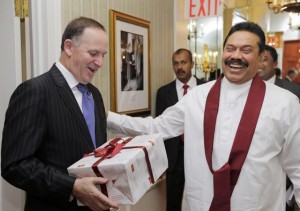 The Prime Minister John Key’s performance this weekend at the Commonwealth Heads of Government Meeting (CHOGM) in Colombo, Sri Lanka caused me to cringe in shame as a New Zealander. But that is nothing compared to the dimming hope that New Zealand’s Tamil community felt on reading what New Zealand did with its opportunity to assert a moral position against an alleged war crimes cover-up.
The Prime Minister John Key’s performance this weekend at the Commonwealth Heads of Government Meeting (CHOGM) in Colombo, Sri Lanka caused me to cringe in shame as a New Zealander. But that is nothing compared to the dimming hope that New Zealand’s Tamil community felt on reading what New Zealand did with its opportunity to assert a moral position against an alleged war crimes cover-up.
And it took an Irish born political journalist to spell it out to us through her Fairfax piece: ‘McCully sits on fence on Sri Lanka war crimes‘.
Andrea Vance’s intro read: “Foreign minister Murray McCully returned from the Tamil-led north of Sri Lanka last night and indicated he believes New Zealand should not support an independent investigation into war crimes.”
Is this what New Zealand has become? Is this all that’s left of this once proud nation’s principles for human rights and global security? Have we really become this thinly disguised parody of Aotearoa New Zealand? A nation suffering the slow inevitable consequence of no-values political exsanguination?
Does this gaggle of ‘good guys’ – John Key and his Cabinet – really represent the moral calibre of our New Zealand? Of you and me?
For those of us who have observed Murray McCully’s politics, his stance in Sri Lanka comes as no surprise. He is after all the Minister of Foreign Affairs who abolished NZ Aid and told Pacific nations that New Zealand will only consider aid relationships with those among them who progress their trade relationships with us – trade for aid is what he called it. Forget need, forget Pacific regional development, McCully’s doctrine is to only oil the cog that stamps out the coin.
So it is no surprise that he returned to Sri Lanka’s capital beaming with praise for the host government, a government that allegedly committed crimes against humanity before and after the conclusion of its civil war with the Tamil population in the north in 2009.
As Vance wrote:
“McCully returned from his fact-finding mission full of praise for government investment in infrastructure, such as roads, housing and small farms. And rejected accusations that he was greasing up to Sri Lanka when he signed “a dairy co-operation agreement with his counterpart Professor GL Peiris, worth about $2 million… laid the foundation stone for a milk chilling plant at Mullaitivu, the scene of one of the civil war’s bloodiest battles, in January 2009… launched an All Blacks supporters club with President Mahinda Rajapaksa’s son Namal, captain of the national side and an MP.
As a gesture of thanks, Sri Lanka’s Minister of Economic Development, Basil Rajapaksa, is freighting a live elephant to New Zealand, and, hand-clapped us as a friend of his regime.
Cheers John and Murray.
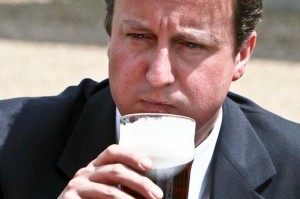 Comparing Key and McCully to their Tory counterpart, David Cameron, Prime Minister of Britain, does conjure up surprise. Cameron toured the same northern provinces of Sri Lanka that McCully did. But Cameron’s story is as different as blood is to oil.
Comparing Key and McCully to their Tory counterpart, David Cameron, Prime Minister of Britain, does conjure up surprise. Cameron toured the same northern provinces of Sri Lanka that McCully did. But Cameron’s story is as different as blood is to oil.
On returning from Sri Lanka’s northern Tamil provinces, Cameron spoke of war crimes, crimes against humanity, and ongoing victimisation warranting an externally commanded independent judicial investigation.
As fellow The Daily Blog writer and former New Zealand Associate Minister of Foreign Affairs, Matt Robson detailed in his piece this weekend:
Cameron, beset by constant revelations of British war crimes in Iraq and Afghanistan and closeness to a host of horror regimes to which weapons are sold with gay abandon as well as the instruments of torture and the personnel provided to train in their implementation, has used CHOGM in Sri Lanka to try and refurbish the tarnished and tawdry image of British imperialism.
Far away from John Key’s smiles and Murray McCully’s awkward ramblings, David Cameron’s Foreign Secretary William Hague met with human rights campaigners in Sri Lanka ; met with the Tamil National Alliance in Colombo ; has pledged to help clear landmines ; met with Sri Lanka’s foreign affairs counterpart and pressed the need for reconciliation between the government and its civilian victims; delivered a public speech in Colombo urging for the prevention of sexual violence being used as a weapon in Sri Lanka; has funded and opened a reconciliation centre; and now the UK has been elected to the UN’s human rights council.
When Cameron argued for an international investigation into human rights abuses, likely United Nations-backed, he said: “The pictures of journalists, shot and killed, on the walls, and hearing stories of journalists who have disappeared long after the war has ended – that will stay with me.”
For his efforts Cameron was consdiered a God by Sri Lanka’s Tamils, and had his car mobbed by government supporters in Colombo. Such is the division inside Sri Lanka today. But John Key and Murray McCully did not see it that way. They both spoke of progress, and of a need to look to the future not at the past.

For New Zealand’s former Public Relations man, Murray McCully… he could not have read the mood in Colombo more wrong. As Amnesty International’s Steve Crawshaw wrote:
“Sri Lanka may well regret having hosted the Commonwealth summit which has proved a PR disaster for the government. Most of the focus has rightly been on the country’s appalling human rights record.”
Crawshaw added: “The challenge for the international community is now to keep up the pressure on the Sri Lankan government. Those responsible for past violations, including war crimes, must be held accountable, and ongoing human rights violations stopped irrespective of rank – victims and survivors must see justice done. The past week has provided clear examples of the government’s repressive tactics.”
The principled stance taken by Canada, India, Mauritius in boycotting CHOGM, and the UK’s tactic of underscoring advocacy for the rule of international humanitarian law, has propelled the Commonwealth to new standards of global relevancy. But not for New Zealand, we couldn’t be more irrelevant to the institution if we presented gifts of rugby ball and jersey.
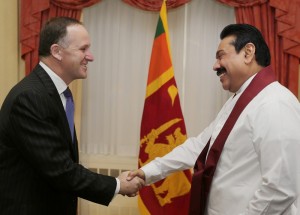 By comparison, thanks to New Zealand’s gaggle of smiling good guys, we managed to squeeze the Sri Lankans for a $2 million dairy products deal (Fonterra says cheers John) and a poor elephant. In exchange, we have eroded what little was left of our long fought for reputation as an honest broker on the multilateral stage.
By comparison, thanks to New Zealand’s gaggle of smiling good guys, we managed to squeeze the Sri Lankans for a $2 million dairy products deal (Fonterra says cheers John) and a poor elephant. In exchange, we have eroded what little was left of our long fought for reputation as an honest broker on the multilateral stage.
The closest John Key got to the Commonwealth humanitarian action was ‘having a drink‘ with David Cameron, but on the eve of that meeting Key dismissed any likelihood of advancement: “I’m not sure what that would achieve, it might be a useful thing.”
Exposed Before One’s Peers
The responsibility for this awful fiasco lies with John Key.
A prime minister or president of any country has a unique opportunity to stamp a nation’s contemporary culture and values on foreign policy – how we see ourselves and our rightful place on the world stage – more so than any minister of foreign affairs.
Don’t know about you, but I fail to recognise this New Zealand that John Key presents to the world. I refuse to accept our New Zealand has truly become this timid, vanilla rendition of nationhood-expression as was displayed by Key and McCully at CHOGM.
There exists a conundrum. New Zealanders have supported this man in percentages enjoyed by few other prime ministers, even when the policies he dictates to us are abhorrent to the majority.
How many tipping points must be guessed at before his popularity begins to truly ebb? Has the mood of popular opinion already begun to receed from the John Key court?
As I see it, John Key abandoned the New Zealand way well before New Zealanders began to abandon him.
As has been highlighted at CHOGM, John Key has been indifferent toward, and estranged from, this nation’s history of projecting a moral argument on a global stage, especially over human rights and global security.
Even domestically, John Key has lacked the empathy necessary to connect to our people beyond the trivial. If you disagree, consider this Youtube ‘selfie’ video that our Prime Minister made just over 24 hours after the 2011 Christchurch February earthquake struck and while Kiwis and visitors from abroad still lay dying beneath the city’s ruins.
As many observe, during a leader’s tenure, should disaster strike, comes a moment that defines his or her leadership. For me this moment, in the first 32 seconds of this video clip, defines John Key. Remember, this man had visited the disaster-zone the previous evening. While he filmed this clip, he knew people lay dead and dying beneath the rubble, he knew fire had and was consuming many. But he chose to apply a positive angle through the frame of a beautiful Wellington day, from the detached estrangement of his 9th floor Beehive office, as the world he observes “wanders by” his balcony.
“Hi there, well today I thought I would do something just a little bit different, and have my video message from the 9th floor balcony which will give you a sense of what the view’s like outside.
Sometimes I come out here on a nice day and just have a look and take the world in as it wanders by my office, or, yea, come out and enjoy some of the Wellington sunshine.
But today I thought I’d do that because in a way it’s a timely reminder that New Zealand is an amazing and beautiful country even if we are experiencing some of the worst of times, arrr, from Mother Nature at the moment. Our hearts are obviously with the people of Christchurch who are suffering not only just a second and devastating earthquake but one that has claimed the lives of many Cantabrians and from people from all around the world.”
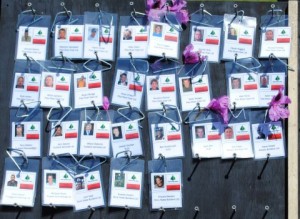 His recent refusal to permit compensation for the families of victims of the Pike River mine tragedy also lacks an empathy expected of a prime minister – a position that demands from the person a sense of simpatico between the New Zealand way and Government. But John Key’s refusal to explore compensation options is best explained by his statement to Parliament last week:
His recent refusal to permit compensation for the families of victims of the Pike River mine tragedy also lacks an empathy expected of a prime minister – a position that demands from the person a sense of simpatico between the New Zealand way and Government. But John Key’s refusal to explore compensation options is best explained by his statement to Parliament last week:
”Obviously, the legal representatives of the family are free to test that case in court. But the Government is also a guardian of taxpayers’ money, and it would need to be very careful about any precedent that it might set.”
This is the man who when questioned on the appropriateness of his jokes replied with a shrug that he had to ‘entertain’ thousands of people every week. The spin implied that with a schedule such as his he was bound to offend some of the people some of the time. Not sure about you, but I have never believed a prime minister’s purpose was to entertain.
We could examine here the examples of ‘crony capitalism’, ‘corporate welfare’, the millions John Key has presented to New Zealand’s Americas Cup challengers, the multimillion dollar gestures to Warner Brothers etc, Rio Tinto, Chorus, South Canterbury Finance, the weirdness of the Sky City Casino deal. (All this has even drawn criticism from former ACT Party leader Rodney Hide who said on this weekend’s Sunday Panel on RadioLive that this John Key government has got too close to corporates and big business.) But these aberrations have been well traversed.
Under John Key our spy agencies have become notorious for illegally spying on Kiwis. His answer, when the illegalities were revealed, was to make what was illegal, legal.
All this has been so often written about. Should we keep writing, keeping a ledger of sorts, so as to understand what we as a nation have become, or should we cast our eyes downward and wait for a day when the sunshine dims on this man’s offerings?
An Identity Crisis
This confusion surrounding this nation’s identity is not solely ours.
In meetings with diplomats (who represent some of this country’s closest friends and allies) where I have provided political analysis, the question that I have been asked most often is: how does one define New Zealand’s foreign policy under this John Key Government?
I answer that the definition is drawn not from New Zealand culture, contemporary national interest, or from certainty, but from the politics of uncertainty, from ad hoc practice where the tactics fail to reveal if there exists a centralised strategy or desired outcome.
But what can be defined through timeline analysis is where New Zealand is heading. Since 2010 John Key and his Cabinet embarked on what I’d call regressive reformation, a back-stepping desire to reconnect to old conservative relationships (despite those connections no longer serving New Zealand’s progressive development interests).
Comparatively, it was so simple to define foreign policy back when National ruled in the 1990s. Under Jim Bolger, it was neoliberal trade-led policy framed through a realignment of reliance away from the old European/US relationships toward Asia and South East Asia.
But as the great southern oscillation has its time and tide, a cycle of sorts, so it seems does New Zealand’s alliances.
Under John Key New Zealand has restored its connection to England’s monarchistic titular honours; sustained our recourse to Britain’s Privy Council (probably to the Justice Minister’s angst); and has signed up to US-led western security alliances.
Table republished from an earlier post:
At the NATO Partnership Agreement signing on June 5, 2012, its secretary general Anders Fogh Rasmussen noted: New Zealand’s partnership programme focuses on improving future cooperation in areas such as cyber-defence…
And in the Partnership Agreement document NATO and New Zealand Government jointly stated:
Increasing economic interdependence, failing states, and new forms of technologies, such as those used in cyber attacks, mean that the risks faced by modern societies extend well beyond national borders.
There has been a backstory of global proportions developing since National took office in 2008. Here is more detail.
- On May 4, 2010 NZ Government signs a US-UK-Canada-Australia-NZ (Five Eyes GCSB network) Declaration asserting that it will help fight international organised crime.
In a Government release the Attorney General Chris Finlayson stated:
“The declaration includes undertakings to establish arrangements for sharing information on policy and legislative responses to, and criminal intelligence on, organised crime. The members also undertake to work more closely to co-operate on capacity building and training.”
- June 7, 2011 NZ Government launches its cyber security strategy.
- September 27, 2011 NZ Government opens its National Cyber Security Centre.
- June 5, 2012 Key signs up to NATO’s ‘Partnership Agreement’.
- June 11, 2012 NZ holds its first ever cyber security awareness week.
- June 20, 2012 NZ Government signs the Washington Declaration binding NZ and US interests.
- September 21st, 2012 US Secretary of Defense Leon Panetta visited New Zealand and entered talks with New Zealand Government officials and ministers.
- January 15, 2013 NZ and the United Kingdom issue a joint statement on cyber security.
NZ Commits to UK’s GCSCBC: In this NZ-UK joint document the two governments state:
“We recognise the gap between supply and demand for cyber security capacity building internationally. The United Kingdom, through the establishment of a new Global Cyber Security Capacity Building Centre (GCSCBC) is looking at how to make better use of the skills and resources internationally to address this issue.
“The United Kingdom and New Zealand will work closely together to ensure these and other efforts can attain full global reach, including how to best support the work of the ASEAN Regional Forum partners and also the Pacific Island Forum’s regional security committee.”
And then there’s the rhetoric within the Washington Declaration.
At the time of signing the Washington Declaration the New Zealand Government stated:
Specifically, the Washington Declaration enhances cooperation in key areas that New Zealand and the US have been working on closely together over the past two years, namely maritime security, including counter-proliferation, counter-terrorism, and anti-piracy…
In the context of the US’ anti-piracy initiatives, including the Dotcom/MegaUpload case the Washington Declaration falls into frame. (Perhaps the political scientists amongst us should deploy more analysis to it under the current context. It would be helpful and important.)
Our Nuclear Free Signature Policy
New Zealand’s signature policy, our nuclear weapons free law, remains. And we have to give John Key credit as he has permitted it to remain long past lunchtime.
Yes, John Key has sustained New Zealand’s position on nuclear disarmament. But only sustained it. He has failed to position New Zealand ahead of the rest of the world’s powers as they have moved toward conveying support for non-proliferation of strategic nuclear weaponry and sought to control its proliferation within those existing nuclear powers.
But New Zealand, under John Key, has failed to develop a progressive argument that challenges the enduring orthodoxy of what some refer to as the impeccable logic of nuclear deterrence.
Nor has New Zealand moved to challenge the 21st Century’s silent development of new tactical nuclear weaponry, with technologies of precision targeting, to pinpoint effect, and contained destruction.
New Zealand, under John Key, has taken its eye off the ball with regard to the proliferation by number of tactical nuclear warheads, the methodologies of how they would be put to destructive use, and under what specific scenarios they would be launched by the United States and its foes.
Few New Zealanders would realise how the number of nuclear warheads above and below our Pacific regional waters has multiplied incognito with the increased deployment of nuclear powered and nuclear carrying warships and submarines to the Pacific by both the United States, the People’s Republic of China, and the Republic of France as the latter watches the two prominent nuclear powers juxtaposition for territorial strategic advantage.
We hear a little via outside sources about this proliferation of military hardware on our Pacific patch, but nothing from our Government.
And what of New Zealand’s cred as a member of the Nuclear Supply Group, a global body that New Zealand holds a veto power, a body that controls the movement of uranium around the world – authorises what countries can buy nuclear fuel and who can sell it to them?
Where is New Zealand on biological and chemical weaponry? Where is New Zealand on the use of depleted uranium? Has John Key ever spoken out on the use of cluster munitions?
What solutions to the world’s security crises has John Key’s New Zealand bothered to think through to the degree where it can pitch a lucid argument to the globe’s multilateral forums?
And this is what I have been building up to through this long rant: What will New Zealand bring to the United Nations Security Council table should it be successful in its bit and be accepted as a non-permanent member?
John Key’s and Murray McCully’s performance at CHOGM will convince few of New Zealand’s credentials.
The Pacific Solutions
New Zealand must adopt a position, and voice it, on the new nuclear power generation technologies. We failed to do so even when Saipan legislated to permit these refrigerator-sized nuclear power generators on its shores.
Even when it was whispered all around the Pacific that Western Samoa, Kiribati also considered them too, our Government remained silent. Even after the Late Tongan King Tupou George 5th delivered a speech from his throne urging his Parliament in Nuku’alofa that its members should explore a sustainable nuclear option with United States corporations. Then too we remained silent.
Do we as a nation believe the island nations of the South Pacific, Melanesia and Micronesia should have these new nuclear techology generators set up on their low-lying coral atolls and shores? Do we really want these things bobbing about in the ocean like alien glow-worms should a Tsunami sweep eastwards after a future seismic catastrophe?
If we don’t, then we owe it to all these nations to suggest solutions to their energy needs. I acknowledge here Meridian and other New Zealand companies have been working with Tonga to discover a sustainable solution to its energy needs to meet its development goals, as has the UNDP and other donors in the small island states around the Pacific including Tokelau.
My point here is that the John Key Government conveys a reticence to engage publicly on these issues, to advocate for Pacific regional solutions.
Where To From Here?
There’s a lot of work to do before New Zealand can regain its rightful label as the South-Western Pacific’s moral compass, a companion of peace, an advocate for the oppressed.
At the earliest opportunity New Zealanders must reclaim these principles that strengthen our relevancy in global affairs – the arguments that in the past permitted us to punch above our weight.
To begin the change requires a simple shift in our collective mindset.
Yes, it will be a brave government that unfurls foreign policies of this ilk. Policies like this will cause unease among some significant trading partners and will anger the leaders of the world’s horror regimes.
But New Zealand’s isolation gives us an advantage should we re-embrace independence over sycophancy. If we overcome that challenge through the morality of our argument we will again guide progressive nations to ratchet up their expectations of what can be achieved in this 21st Century.
For the sake of humanity, let’s hope we do.
So, you and I have got to the end of this piece. Maybe it’s a generational thing after all. For what we lay down for our children and how we encourage them to do the same for their children is perhaps the most difficult challenge that offers the biggest reward.
Thanks for listening to my rant. I hope you consider these views and convey them in conversation. Because, I suspect like me a lot of you sometimes wonder whether the majority around here feels the way we do.

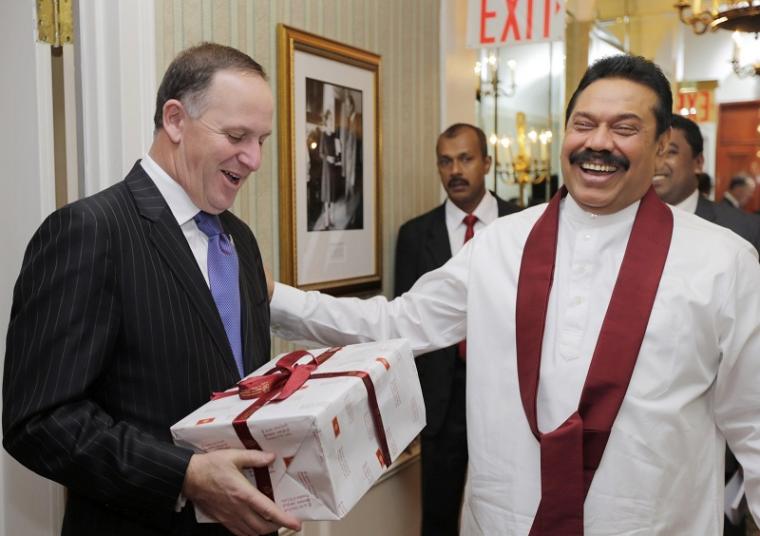
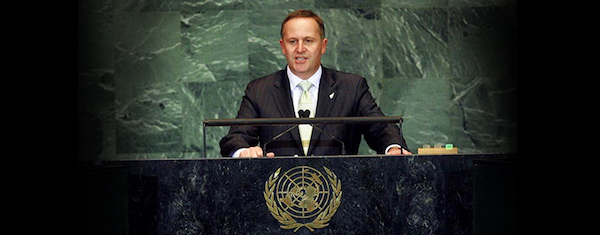
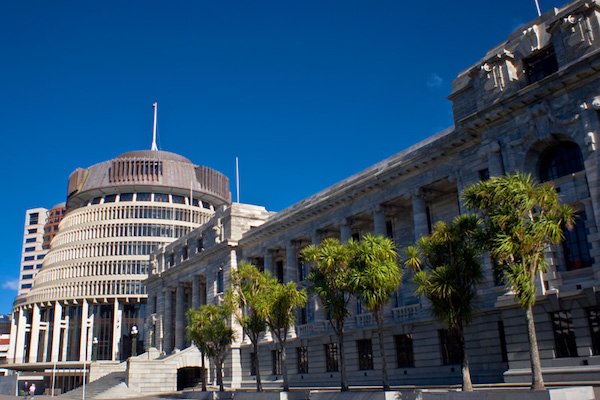
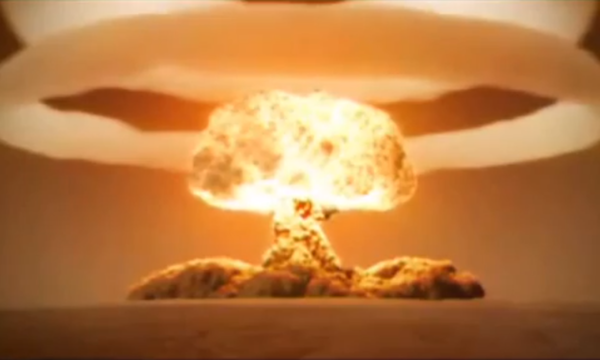




An excellent summary article and great contribution, Selwyn!
Indeed, John Key is a friend of little elephants now, as that is what he pulled off. He does as a smart corporate business boss avoid getting involved in pushing human rights issues, as that is not his priority. If he ever bothers to mention human rights, it is more so to make himself feel “good” and to please the few critical onlookers from home.
In reality his mind is set on agendas and goals. Those agendas and goals are nothing but business, and promoting New Zealand as a business partner, as an exporter, as a destination for well enough tourists. Also of course his main pet project is to promote New Zealand by courting leaders from various nations, to try and get their vote of support, so New Zealand and HIS government (and with that himself) being able to “decorate” himself with having achieved to get the country placed on the UN Security Council.
So he brings home little elephants for a local zoo, and he deal of some dairy cooperation, and hopefully better export terms for Fonterra.
Values, those are things Key does not put much weight on, as he is not a man of principle. He makes arrangements over cups of tea, glasses of beer and by chatting with big business leaders from overseas.
This New Zealand we have become under this goverment, is markedly different to the time under Helen Clark, and most certainly very different as under David Lange and his government’s foreign policy.
“Realpolitik” may come closest to Key and his government, but that even may be too much of a compliment.
Leaving it to David Cameron to send a message to the Sri Lanka’n leadership is another cop-out, one of many. I suspect though, Cameron only did what he did, as he got a lot of pressure from home to say something, and also have UK media been exposing what goes on in Sri Lanka. So he had to do something.
But New Zealanders themselves are these days rather indifferent people, mindful of job security, the needs to export, the benefits of doing business, and to dance along with the boss, so to ensure that lifestyles can get maintained for the majority middle class and upper middle class. All else has for the majority of New Zealanders sadly become of secondary importance, if of any at all.
The local media here is too busy to write articles on the newest fads from overseas, lifestyle issues, the usual crime and horror news, and sports. So they spend too little time also on what happens in regards to human rights in other places. Tibet is another place that used to be raise by some, but who does bother raising it these days, as the trade with Mainland China is the dominant factor they rather wish to consider.
Do not mess with overseas governments and continue to distract and also keep local dissent at bay, that is what the mostly corporate controlled mainstream media are interested in.
So it is not really any wonder that we have Key get away with all this, and only few like on this blogsite actually raising what should be of concern.
Thank you for doing so, Selwyn Manning!
“I suspect like me a lot of you sometimes wonder whether the majority around here feels the way we do”
I used to wonder, strangely enough contemplating a move to either India or Canada, possibly even Brazil – two that boycotted CHOGM.
Thankfully, amongst those I speak to, there seems to be an increasing awareness of what that “nice charasmatic John Key” is really about. They can now even see when the guy is lying through his teeth whilst attempting a straight face.
More and more people are becoming directly and adversely affected by the policies of this sociopathic philistine – the ‘tipping point’ is near.
The only thing I wonder about these days is when that will happen – as well as how the hell fellow Kiwis actually put any faith in the guy in the first place. The stereotypical lying used-car salesman slick with talk and promises. Trouble is, after 5 years he’s developed a record, and the trouble for his colleagues is that they’ve lost all credibility through their hero worship of him (as have many MSM journalists)
Many NZers are even waking up to the fact that the man is truly an embarrassment internationally. Too much has happened – probably starting with the Sackur interview.
There’s only so much national pride a society can derive from a rugby team.
Rest assured, in a few years John Key will go down as NZ’s worst Proim Munsta.
Will I wait? roll on 2014!
ekshly – I think I know “how the hell ” Kiwis put faith in the guy in the first place.
It comes down to disarray in Labour and perceptions of a nenny state – centred around shower heads, strangely enough.
As well as a 3rd term of that ‘bloke’ they call Helen.
Never did they imagine that an alternative (“change you could rely on”), would be a creeping fascism. Unfotrunately, it all coincided with a great Black hope elsewhere in the name of some Uncle Thomas called BrakmBama.
Note: Rest assured – there’ll be a troll along shortly to counter the label [FASCIST]. Some might even come equipped with righteous indignation as to how their ancestors fought against ‘ all that stuff ‘.
……. as, no doubt they did, various Commie bastards. Some of them may have even taken packaged tours on ANZAC day around Turkey.
(btw ….. boy!!!! do they have a fukn surprise for you in coming years! if you’re part of the neo-l; USA land of the free brigade)
Actually, most of them confuse the two – when totalitarianism of the extreme left, and the extreme right come to meet – there really isn’t much difference.
But let’s not delude ourselves how far right a political pendulum has swung, such that a current National Party can be characterised as ‘centrist’, when in fact that NZ has come the closest to Fascism in its entire history.
Never mind though aye!
Next
next
Like I said …. 2014, and I’ll probably be watching from a sub-equatorial sideline if the sheeple have sufficiently woken from their slumber
Normally I have too much to say – All I have to say after reading this was – Thanks! Thanks for spelling it out. Thanks for saying what so desperately needs to be said and yes i do expect more from our leaders than the grinning sycophantic behavior floated as diplomatic relations.
I only hope that the 800,000 who did not vote last time see the importance of using the limited democracy we have to scatter these nefarious roaches back to their shadowy lairs.
Excellent article:
Bur in the end, you need only ask ” What should one really expect from someone who made his millions as a non-economically productive money-trader? From someone who then entered politics to become PM with virtually zero political experience? From someone who has specialised in maintaining the political status quo rather than in advancing the country either politically or socially?”
I think I understand John Key more than I understand the 40 percent who vote for him.
I can’t add much more to the above superb Post or the equally superb comments .
However , I will say this ; fabulous photographs . If ever there’s a better example of a picture saying a thousand words I’d like to see it . What a loathsome , toadish , greedy little conman jonky is ?
Your Post Selwyn Manning wasn’t a rant . It was informative and passionate . I so often hear that word used , usually to defame or in some way undermine my very own equally passionate expressions on my chosen subject .
To them I say ‘ Fuck you , if you can’t take a joke .
God knows , we need as much passion as can be squeezed from us in our Pavlova Paradise .
I live across from a Presbyterian church and the pious , puritanical , hypocrisy radiating from that ugly edifice to conservatism is peeling the paint on my windowsills but it is useful to ponder to aid coitus interruptus , not that I have any coitus to interrupt these days .
I see jonky as a grave digger in reverse . He’s desperately trying to bury his own lies by arguing
‘ Nothing to see here , now move right along and into a new and brighter future . Never mind the bodies . They’re dead so there’s nothing we can do about them . Ok , move along ( Shrug ) I’m comfortable with this . ‘
Between the above paragraph and the action of an anti-jonky mob throwing a rope over a stout branch is the membrane between parallel Universes . How to penetrate that membrane ?
A Leader . A leader is what’s needed . I wish I was a leader . I am not . I’m not a follower either which means I’m no use to man nor beast .
We need a Leader . New Zealand desperately needs a Leader . A good , true , honest , brave , genuine , urbane fused to rural leader . Either a Mans Man or a Womans Woman . Of any colour or gender . I don’t give a fuck . Someone who can express love and empathy when the shit hits the fan for those lost souls who give credence to the vengeance sect to be used to profit Insurance Industry Darkness Peddlers .
Not some husk of a creature with pennies for blood . Not some weasly , freak show host more a freak than the shows freaks . Because honestly , this freak show is getting pretty fucking freaky !
Isn’t McCully a total embarrassment? How can anybody take him seriously? And he represents us, for gods sake. The jonky/McCully double act makes Bush and Cheney look progressive and enlightened. We deserve better, don’t we?? Well don’t we?????
“Horror Regimes, Identity Crises and Self-Serving Sycophancy”
Thank you Selwyn. You pose the question why and how has John Key has got a away with it. Part of the answer is, because we have let him.
We cover for many of his crimes because we too are guilty of them, and to point them out clearly, is to condemn ourselves.
We point out some things and ignore others, this discredits the opposition in the eyes of the public.
The left say things in opposition but lose their voice when in power.
We admit some things but leave some things unsaid.
Helen Clark drank champaigne and partied up in Beijing on the eve of signing a trade ageement at the same time as the Chinese army was slaughtering the people in Tibet.
The biggest left website in the country has not had one post on Deep Sea oil drilling in our waters. (Oops correction)[i].
Shane Jones berates and shouts down Russell Norman in parliament. Jones was trying to silence Russel Norman’s reading of Yeb Sano’s speech in the wake of the Tacloban disaster in the Philippines pleading for us to cut down on fossil fuels. But the Left only condemn National’s Tau Henare, and Jami-Lee Ross for trying to silence Norman.
Sea bed mining and deep sea oil are only possible because of Labour’s Raupatu of the Seabed and Foreshore which deprived Maori of their rights recognised in the treaty as Kaitiaki to take legal action to protect the marine environment.
We support a Mayor of the country’s biggest city who is anti-union and who’s council has just granted consents for deep sea oil exploration off Auckland’s West Coast beaches, because he is “Left”.
We ignore the fact that our current Prime Minister signs a treaty with the Pacific Island nations promising to endeavor to cut back our fossil fuel use and then gives over $100 million to Solid Energy to let them continue mining coal.
mickysavage a leading light in David Cunliffes West Auckland campaign committee and author at ‘The Standard’ says that it is “totally untrue” that The Standard are keeping their silence on the Solid Energy bail out. mickysavage says he is working on a post on the bail out,[i] but then never posts it. How many weeks has it been now?
The Daily Blog does an interview with David Cunliffe and does not ask him one question about climate change, deep sea oil drilling, or new coal mines.
Climate Change is the biggest and deadliest threat ever faced by humanity but we keep our mouths shut.
The subliminal message that is being continually reinforced by the Left, is that John Key and the Right’s Business As Usual practices are not that unreasonable after all. Nothing to worry about, steady as she goes, nothing to see here, no need to change.
[i] http://thestandard.org.nz/oil-rigs-coming-to-a-beach-near-you-2/
Stop press. In late news mickysavage has just put one on this morning, but only because it directly affects him, as it is right in his West Auckland electrorate where he can’t ignore it, without being totally discredited)
[ii] http://thestandard.org.nz/open-mike-061013/#comment-706094
“totally untrue.”
“The solid energy post is a post that I am working on”
Xox
Great post Selwyn , and Comments too. THE GREAT UNVOTERS must turn out come 2014 to vote for demockary or else we will get more of the same, only worse! 😉
Bring on Russell Brand’s revolution. It is time the whole idiot show was locked up and the ‘Key’ tossed away!
Great post Selwyn so much good analysis of things, I too was appalled and ashamed at key’s (and McCully, useless turd) performance in Sri Lanka, at least Cameron did do something, as a country that has spoken out on human rights we are going backwards in this area at a great rate.
I particularly liked Jenny’s post in reply. I think the inference from many is that we mustn’t criticise Cunliffe as he is party leader of Labour and they are now moving to the left. I’d debate really whether they are on the left myself, but putting that aside. We musn’t fight or criticise because we need people to see and think that we have it all together this time and we can get rid of the Nats. But there are so many things we need to nail Labour down on before we get to the election, the TPP (and future ‘free’ trade agreements), climate change, the GCSB and SIS, fossil fuels, a living wage, increased benefits, real jobs, affordable housing and I could go on.
I think so long as we have useless interviewers – did anyone see the shocker with the Sri Lankan PMs brother on The Nation I think it was, talk about soft interviewing what a complete waste of time and space.
Key continues to talk about Labour going into coalition with the Greens and them being far left, he likes that scare mongering talk and then talks about the Nats being a centrist party the more he gets away with this sort of crap the more depressing it is really. No interview ever asks him to explain how the Greens are far left or any of that, sound bites sound bites sound bites. Shame on the main stream media.
Your PM is over here in Bangkok doing a good job on trade negotiations.
Over 20 trade reps here also.Quite a few deals done. Yes the greens are very scary, and the Cunliffe 1 who can turn blood into water, also, nut no worry it won’t happen. Its sad that Socialists don’t have a sense of fun, and wait for the doomsday.
Weather good here, No voolence or disasters for the PM to fix
I quite liked the elephant.
In Sri Lanka it symbolizes the state violence that John Key ‘forgot’ to talk about. It should be sent to the beehive, where it’s presence in the house can represent the millions of New Zealanders that the Key government does not represent, and the many things that need to be done that this government are not doing.
The only problem with the elephant is that it may not be big enough to fill the vacancy left by Key’s many shortcomings.
“…even when the policies he dictates to us are abhorrent to the majority”
FFS get a little perspective. I’ve thought for a long time that the Tea party in the US base mentality is best exemplified by the left in NZ and this just confirms it.
John Key and the current National party are quite moderate and middle of the road. There is nothing terribly radical about their policies. It is probably why his popularity is still very high.
I know from previous experience that attempting to engage with you in rational argument is fairly futile, but here goes (takes big breath).
Tax cuts for the very wealthy, and an increase in gst to help compensate for the reduced cashflow. Criminalising of peaceful dissent (at sea). Erosions to workers rights which continue to marginalise the poorest paid and therefore most vulnerable. Lack of any meaningful action on climate change (actually, it is real). Bail-outs and dodgy deals to corporate buddies, while demonising beneficiaries for supposedly leeching off society. Total inaction as company after company has closed up shop and over 40,000 manufacturing jobs go. Complete bankruptcy with any idea as to how to stimulate the economy apart from gambling, mining, drilling or selling assets. Rampant inequality with 70% of NZers earning less than 43,000.
Doesn’t sound very “moderate and middle of the road” to me. More like a bunch of robber barons who are working hard to siphon off as much as they can before they get turfed out.
None of those are very radical at all.
National campaigned in 2008 on Tax cuts and won the election so it is hardly unexpected. They haven’t really impacted the marginal rate of tax much for wealthy NZers. If they were really hard right then the National party would have cut income taxes even more than they did.
The changes to employment law which have only been tinkering around the edges. They are hardly in the same ballpark as the original Employment contract act. People on the left were banging on about the changes when they were first introduced as if they would lead to Armageddon in the work place but have strangely gone relatively quiet on them since then.
Previous right wing governments have divested itself completely of assets. This Government has not done so and only sold a minority stake after it had campaigned for it to win power for a second term.
The key area which highlights the moderate nature of the Governement is that they did not slash public spending. There were ample opportunities to ditch left wing popularist policies such as interest free student loans and working for families yet these two policy programmes have been largely untouched. The key areas of government spending (namely Health, Education, Social Welfare, and Superannuation) have largely been untouched in terms of spending.
You might not like the Government but you can’t argue that it is a radical right wing one at least in terms of recent NZ political history. The Bolger government was much more radical in nature.
Interesting analysis.
[…] Horror Regimes, Identity Crises and Self-Serving Sycophancy By Selwyn Manning – See more at: https://thedailyblog.co.nz/2013/11/18/horror-regimes-identity-crises-and-self-serving-sycophancy/#sth… […]
Comments are closed.